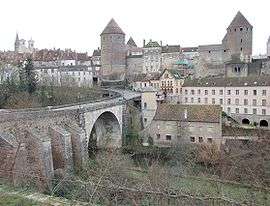Semur-en-Auxois
| Semur-en-Auxois | ||
|---|---|---|
 | ||
| ||
 Semur-en-Auxois | ||
|
Location within Bourgogne-Franche-Comté region  Semur-en-Auxois | ||
| Coordinates: 47°29′29″N 4°20′01″E / 47.4914°N 4.3336°ECoordinates: 47°29′29″N 4°20′01″E / 47.4914°N 4.3336°E | ||
| Country | France | |
| Region | Bourgogne-Franche-Comté | |
| Department | Côte-d'Or | |
| Arrondissement | Montbard | |
| Canton | Semur-en-Auxois | |
| Government | ||
| • Mayor (2014–2020) | Catherine Sadon | |
| Area1 | 19.14 km2 (7.39 sq mi) | |
| Population (2008)2 | 4,240 | |
| • Density | 220/km2 (570/sq mi) | |
| Time zone | CET (UTC+1) | |
| • Summer (DST) | CEST (UTC+2) | |
| INSEE/Postal code | 21603 / 21140 | |
| Elevation |
237–423 m (778–1,388 ft) (avg. 286 m or 938 ft) | |
|
1 French Land Register data, which excludes lakes, ponds, glaciers > 1 km² (0.386 sq mi or 247 acres) and river estuaries. 2 Population without double counting: residents of multiple communes (e.g., students and military personnel) only counted once. | ||
Semur-en-Auxois is a commune of the Côte-d'Or department in eastern France. The engineer Edmé Régnier L'Aîné (1751–1825) and the Encyclopédiste Philippe Guéneau de Montbeillard (1720–1785) were born in Semur-en-Auxois.
Semur-en-Auxois has a medieval core, built on a pink granite bluff more than half-encircled by the River Armançon. The river formerly provided motive power for tanneries and mills, but its flow is now somewhat reduced by the Lac de Pont, a dam built upstream in the 19th century to provide water for the Canal de Bourgogne.
Population
| Historical population | ||
|---|---|---|
| Year | Pop. | ±% |
| 1793 | 4,617 | — |
| 1800 | 4,291 | −7.1% |
| 1806 | 5,065 | +18.0% |
| 1821 | 5,053 | −0.2% |
| 1831 | 4,544 | −10.1% |
| 1836 | 4,035 | −11.2% |
| 1846 | 4,129 | +2.3% |
| 1851 | 3,971 | −3.8% |
| 1856 | 3,708 | −6.6% |
| 1861 | 3,590 | −3.2% |
| 1866 | 3,760 | +4.7% |
| 1872 | 3,765 | +0.1% |
| 1876 | 4,130 | +9.7% |
| 1881 | 4,307 | +4.3% |
| 1886 | 3,894 | −9.6% |
| 1891 | 3,908 | +0.4% |
| 1896 | 3,835 | −1.9% |
| 1901 | 3,655 | −4.7% |
| 1906 | 3,512 | −3.9% |
| 1911 | 3,411 | −2.9% |
| 1921 | 3,009 | −11.8% |
| 1926 | 3,042 | +1.1% |
| 1931 | 3,024 | −0.6% |
| 1936 | 3,017 | −0.2% |
| 1946 | 3,257 | +8.0% |
| 1954 | 3,324 | +2.1% |
| 1962 | 3,399 | +2.3% |
| 1968 | 3,812 | +12.2% |
| 1975 | 4,334 | +13.7% |
| 1982 | 4,619 | +6.6% |
| 1990 | 4,545 | −1.6% |
| 1999 | 4,453 | −2.0% |
| 2008 | 4,240 | −4.8% |
Sport
Semur-en-Auxois was the start of Stage 6 in the 2007 Tour de France.
International relations
Semur-en-Auxois is twinned with:
 Cranleigh in Surrey, UK (since 2008)
Cranleigh in Surrey, UK (since 2008) Laigueglia in Italy
Laigueglia in Italy Höhr-Grenzhausen in Germany
Höhr-Grenzhausen in Germany
Sights
- The church, La Collégiale Notre-Dame, which was started in 1225 and built in flamboyant Gothic style. It was restored in the 19th century by Viollet-le-Duc. The north tympanum depicts the legend of St. Thomas.
- La porte Sauvigny, built in the 15th century, it marks the entrance to the city
- The fortified castle, built in the 13th century and dismantled in the 17th century, the parts visible today are:
- La tour de l'Orle d'Or, with a height of 44 metres and walls 5 metres thick
- La tour de la Gehenne
- La tour de la Prison
- La tour Margot, behind the theatre.
- Location: 47°29′26″N 4°19′47″E
- Bridges of the city crossing the Armançon:
- Le pont Joly, which provides a picturesque view of the city
- Le pont Pinard
- Le pont des Minimes
- The ramparts provide a promende with views of the river
See also
References
External links
| Wikimedia Commons has media related to Semur-en-Auxois. |
| Wikivoyage has a travel guide for Semur-en-Auxois. |
